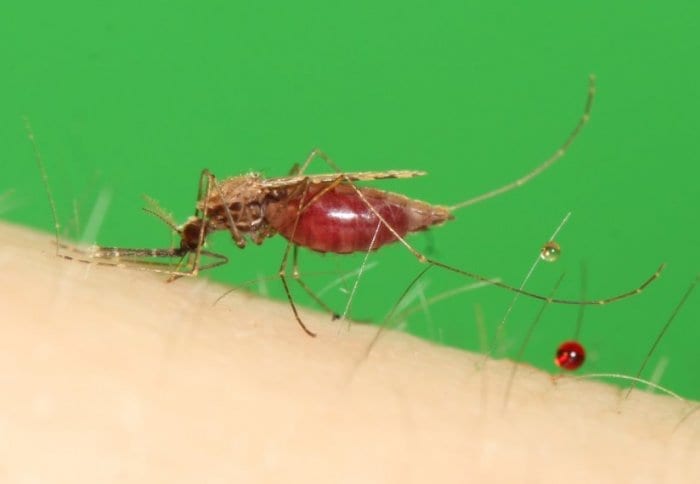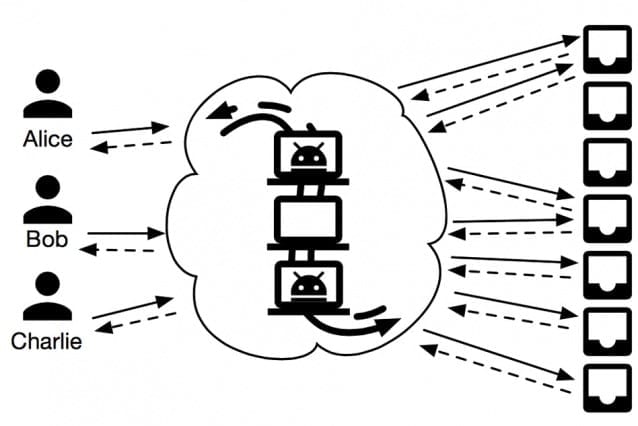
The mosquito species Anopheles gambiae is a major carrier of dangerous malaria parasites in sub-Saharan Africa, where 90 per cent of annual malaria deaths occur. Malaria infects more than 200 million people each year and causes more than 430,000 deaths.
Now, a team of researchers led by Imperial College London have genetically modified Anopheles gambiae so that they carry a modified gene disrupting egg production in female mosquitoes. They used a technology called ‘gene drive’ to ensure the gene is passed down at an accelerated rate to offspring, spreading the gene through a population over time.
Within a few years, the spread could drastically reduce or eliminate local populations of the malaria-carrying mosquito species. Their findings represent an important step forward in the ability to develop novel methods of vector control.
BIASED INHERITENCE
Normally, each gene variant has a 50 per cent chance of being passed down from parents to their offspring. In the Imperial team’s experiments with Anopheles gambiae, the gene for infertility was transmitted to more than 90 per cent of both male and female mosquitoes’ offspring.
The technique uses recessive genes, so that many mosquitoes will inherit only one copy of the gene. Two copies are needed to cause infertility, meaning that mosquitoes with only one copy are carriers, and can spread the gene through a population.
This is the first time the technique has been demonstrated inAnopheles gambiae. The team targeted three different fertility genes and tested each for their suitability for affecting a mosquito population through gene drive, demonstrating the strength and flexibility of the technique to be applied to a range of genes. The results are published today in the journal Nature Biotechnology.
“The field has been trying to tackle malaria for more than 100 years. If successful, this technology has the potential to substantially reduce the transmission of malaria,” said co-author Professor Andrea Crisanti from the Department of Life Sciences at Imperial.
NEW APPROACHES
“As with any new technology, there are many more steps we will go through to test and ensure the safety of the approach we are pursuing. It will be at least 10 more years before gene drive malaria mosquitos could be a working intervention,” added Professor Austin Burt from Imperial’s Department of Life Sciences.
Read more: Modified mosquitoes could help fight against malaria
The Latest on: Gene drive
[google_news title=”” keyword=”gene drive” num_posts=”10″ blurb_length=”0″ show_thumb=”left”]
via Google News
The Latest on: Gene drive
- Genomic analysis of a species of zooplankton questions assumptions about speciation and gene regulationon April 26, 2024 at 6:40 am
When two animals look the same, eat the same, behave the same way, and live in similar environments, one might expect that they belong to the same species.
- FDA approves Pfizer's first gene therapy for rare inherited bleeding disorderon April 26, 2024 at 6:34 am
The Food and Drug Administration on Friday approved Pfizer’s treatment for a rare genetic bleeding disorder, making it the company’s first-ever gene therapy to win clearance in the U.S.
- Examining the impact of gene-based breeding on agriculture and medicineon April 25, 2024 at 10:22 am
A research team has demonstrated that gene-based breeding (GBB) offers a transformative approach to advancing plant and animal breeding, showing remarkable predictability, speed, and ...
- Blocking gene may halt growth of breast cancer cellson April 25, 2024 at 9:35 am
Shutting down a gene called PRMT5 stopped metastatic estrogen receptor-positive (ER+) breast cancer cells from growing after they acquired resistance to a standard therapy known as CDK4/6 inhibitors, ...
- N.Y. doctors perform first-of-its-kind gene-edited pig kidney transplanton April 25, 2024 at 8:33 am
Doctors successfully implanted a pig kidney into a critically ill New Jersey woman, complementing this with a groundbreaking heart procedure.
- Gene variants linked to pesticide exposure may increase risk of Parkinson'son April 25, 2024 at 8:10 am
It's long been known that exposure to agricultural pesticides can greatly raise a person's odds for Parkinson's disease. New genetics research now reveals those who might be most vulnerable.
- Researchers uncover SNUPN gene responsible for a new muscular disorderon April 24, 2024 at 8:03 am
A study, published in Nature Communications, sheds light on a newly identified subtype of muscular dystrophy, revealing an unsuspected role of SNUPN gene in muscle cell function.
- A key gene helps explain how the ability to glide has emerged over-and-over during marsupial evolutionon April 24, 2024 at 8:00 am
People say "When pigs fly" to describe the impossible. But even if most mammals are landlubbers, the ability to glide or fly has evolved again and again during mammalian evolution, in species ranging ...
- CDB mum on Dr Gene Leon’s ‘immediate effect’ resignationon April 23, 2024 at 4:21 pm
BRIDGETOWN, Barbados (CMC) — The Caribbean Development Bank (CDB) Tuesday remained mum on the resignation of its president, Dr Hyginus ‘Gene’ Leon, who has also threatened to file a lawsuit against ...
- Generative A.I. Arrives in the Gene Editing World of CRISPRon April 22, 2024 at 1:48 pm
Much as ChatGPT generates poetry, a new A.I. system devises blueprints for microscopic mechanisms that can edit your DNA.
via Bing News










